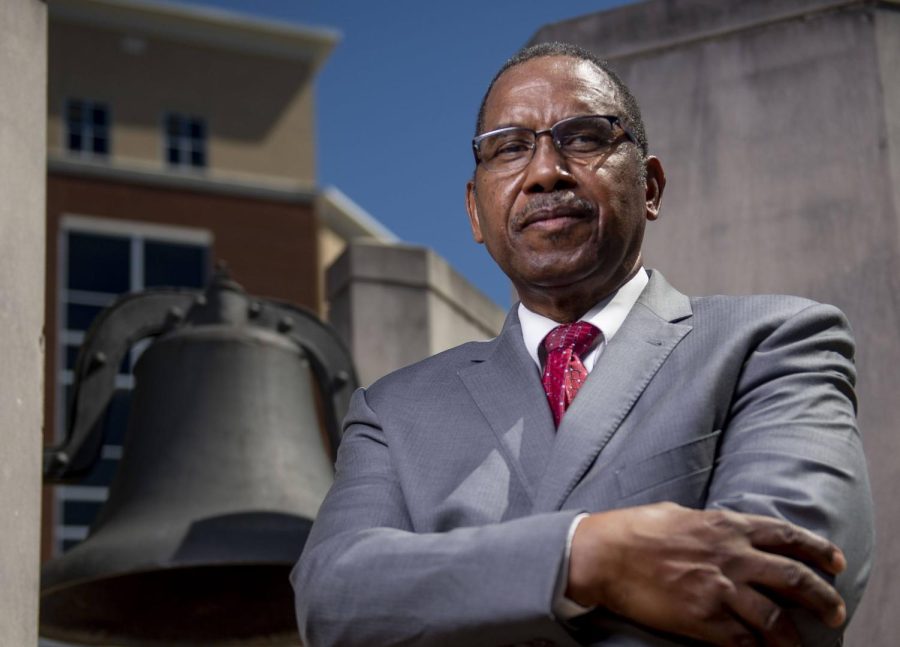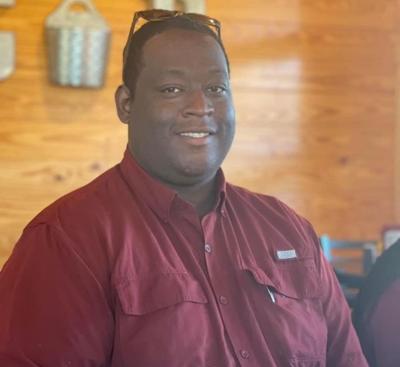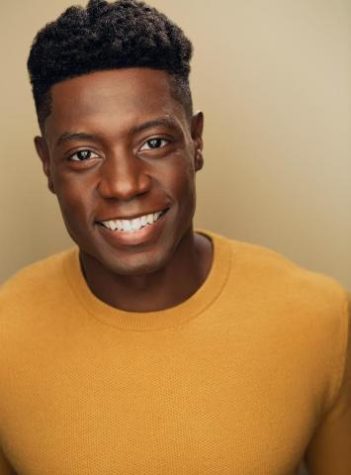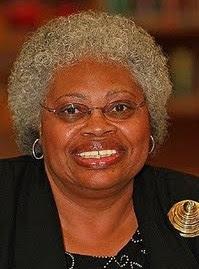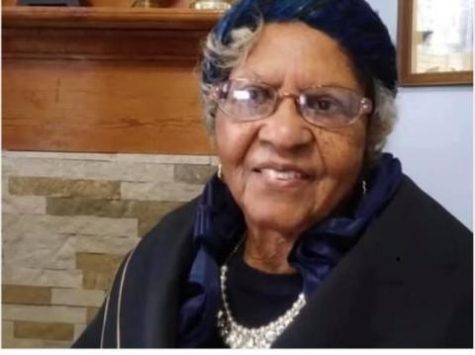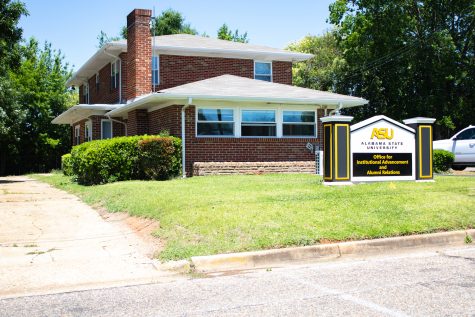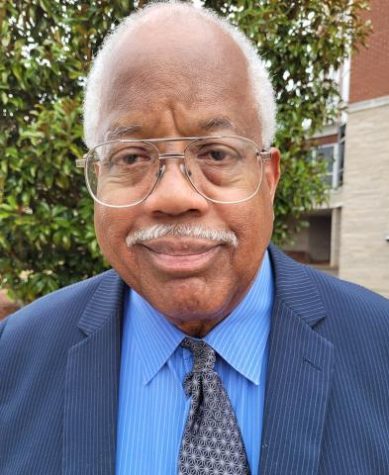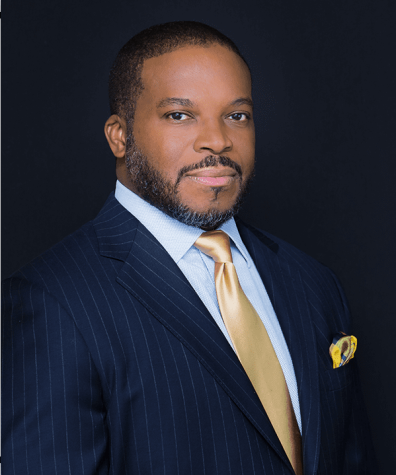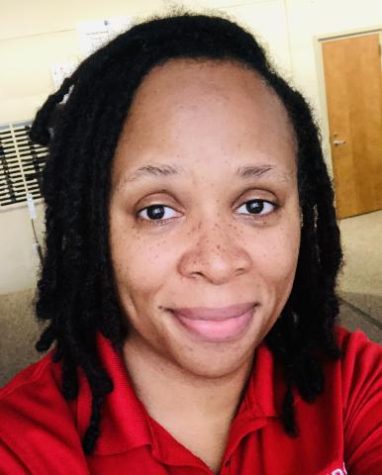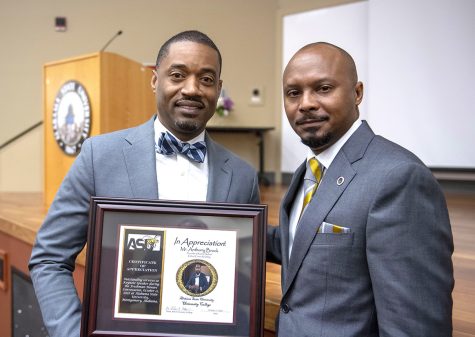Alumnus Richard Bailey shares the history of Alabama
PHOTO BY DAVID CAMPBELL/UNIVERSITY PHOTOGRAPHER
Alabama State University alumnus and noted historian Richard Bailey takes a minute as he reflects upon the contributions that the university faculty and staff made upon his professional progression.
September 18, 2021
The American civil rights movement of the 20th century is one of the most pivotal moments of African American history. With Montgomery, Alabama serving as the center of the movement, the city was brewed with heroes motivated by their faith and the protection of their culture.
Considering the movement took place decades ago, there are a select few individuals who were able to experience the crusade firsthand, with Alabama State University alumnus Richard Bailey being one. Though he was too young to truly understand the importance of what he was witnessing at the time, he has since illuminated the role of Montgomery, and the overall history of Blacks in Alabama, in the present day. Motivated by his passions for his research and people, Bailey serves his state as a well-accredited historian, archivist, and novelist.
“I still have not stopped doing research because I am still finding things that I did not know,” he said. “I have never stopped, and I never will stop.”
Bailey grew up as one of 12 children of Raymond Bailey Sr. and Lottie Parks Bailey. While living in Montgomery, he grew up in the Centennial Hill neighborhood. Because he lived only a few blocks from Alabama State University, many of his earliest memories are of witnessing Hornet Nation.
“One of the things I remember from growing up so very well, and shall never forget, is on Saturday nights hearing the crowds roar from Hornet Stadium,” he said.
As an adolescent, Bailey worked as a newspaper delivery boy for the Montgomery Advertiser. On this paper route, he was able to interact with many notable figures of the civil rights movement who lived in his very own neighborhood. In Centennial Hill, he lived only a few houses away from Georgia Gilmore, who led the fundraising for the Montgomery Bus Boycott; Rufus Lewis, voting rights activist who eventually became the first African American U.S Marshal; Charles Langford, an attorney who represented Rosa Parks; and even a few streets down from Martin Luther King Jr. himself.
“There was a lot of activity going on in my neighborhood,” Bailey said. “But at that time, I was too young to appreciate it while I was growing up.”
He attended Booker T. Washington High School, where he took part in many extracurricular programs. He was a member of the basketball team, football team, and most notably, the theater club. Having an affinity for the arts, Bailey held roles in 14 productions during his tenure in high school. He most fondly remembers performing, “Witness for the Prosecution,” a courtroom drama, but appreciates every moment spent onstage.
“We did [Witness for the Prosecution] while I was in the 10th grade,” he said. “We also did Wildcat, and we did Craig’s Wife, Sorry Wrong Number, and more. Those are just a few of the 14.”
It was also as a student that he explored his love for history and English. As an avid writer, Bailey kept a notebook of poems that he frequently added to. His poetry skills were so good that he even wrote the class poem, which was recited at his graduation. In the realm of history, following the encouragement of an ASU student-teacher he encountered, he began to stay informed on current events. This interest in current events would eventually grow into a love for history that would carry him throughout his adult life.
“I realized that I really liked history,” Bailey said. “And that was only the beginning.”
Upon his high school graduation in 1966, there was no hesitation about where he would choose to attend a university. From growing up so near to the Hornets’ Nest, it was as if ASU was already ingrained into who he was as a person.
“It was never anything to decide,” he said. “It was never a question. … It is just like why you never ask yourself what your name is. You know your name. If I was going to college, I was going to Alabama State.”
In the fall of 1966, Bailey enrolled at ASU as a freshman but struggled with deciding his course of study. He first considered mathematics as he always had a knack for numbers, then physical education because he enjoyed fitness, and then catered to his writing skills by considering English, but eventually decided on both of his loves.
“I decided that I would major in history and minor in English, and that has stuck even until this day,” he said. “And by that, I mean without regrets.”
As a student, Bailey adopted an active role on campus. Though he participated in a number of organizations and projects, he most particularly remembered his time as the junior class president, pledging Kappa Alpha Psi Fraternity Inc. by way of the Beta Zeta Chapter and serving as the president of the Panhellenic Council. While his inclusion in organizations added to his overall undergraduate experience, he considers his moments celebrating homecoming to be his most memorable. Remembering homecoming to be an event of fellowship and fun for all, he insists that it encapsulated the true Bama State spirit.
“If you can imagine what the Super Bowl atmosphere is like now, that is what Thanksgiving was growing up,” Bailey said. “It was a combination of Christmas, Fourth of July, and Thanksgiving.”
Along with the experiences, he also holds a deep appreciation for the ASU faculty that he encountered as a student. He held the honor of being taught by instructors who had active roles in the Civil Rights movement, a few of those being Benjamin Simms, the organizer of transportation during the Bus Boycott, and Thelma Glass, a member of the Women’s Political Council.
Bailey believes it was the work of those great minds that challenged him to grow to his fullest potential. While he might not have fully understood their role in the community, their force in the classroom was undeniable. He especially remembers his time in Thelma Glass’ World Geography class, where he wrote a play titled, “Should the South Diversify its Economy?” a courtroom drama for his group to perform as a project.
“I told the members of my little group, and I shall never forget it, ‘Y’all do not have anything to do,’” said Bailey. “‘Not one thing!’”
He specifically cherishes his time learning under Rita Almond, a scholar of statistics and education. Though Almond had no biological sons, she honorarily adopted Bailey as her own. Her mentorship created a bond that continues to last long after her passing, as he still holds many of her personal belongings that would have otherwise gone discarded.
“It was a kind of family atmosphere,” he said. “They were tough now, do not get me wrong. But they were caring.”
Bailey finished his undergraduate studies in May 1971 with a bachelor’s degree in history. He chose to continue his graduate studies at ASU, which awarded him a master’s in education with a history concentration in 1972. He then attended Clark Atlanta University in Atlanta, Georgia, where he received his master’s in administration with a history concentration in 1973.
Motivated by his passions for education and history, he then began his career as an instructor at Tuskegee University in Tuskegee, Alabama, where he taught World Civilizations. After only one year, he relocated to Lorman, Mississippi as an instructor of World Civilizations at Alcorn State University. In 1976, Bailey received a fellowship from Cleveland State University and the University of Massachusetts to travel abroad to study in Europe and Africa. He then returned stateside to work as the professor of Black History at Kansas State University in Manhattan, Kansas. He returned to his hometown of Montgomery, Alabama, in 1982, where he began his long-running career with Maxwell Air Force Base as a research and writing specialist.
“I have a passion for research,” he said. “And that is what the jobs that I have worked have allowed me to do.”
During his time at Kansas State University, Bailey began his studies toward gaining a doctorate. Given the task of studying the history of Black officeholders in the state of Alabama, he quickly found that it would be no easy feat.
“When my professor mentioned the topic, I said to myself, ‘I will never graduate,’” he said. “Because almost nothing had been written on the subject.”
To conduct his studies, he took sanctuary in the Alabama Department of Archives and History. He began his research in August 1979 and studied at the ADAH for 15 months straight, six days a week, eight hours a day. By utilizing mostly primary sources, he was able to make many discoveries regarding the Black community’s role in the development of the state of Alabama during the Reconstruction era.
“We have just touched the surface,” Bailey said regarding the history of African Americans during the Reconstruction. “The field is just that rich, in this state and in this country.”
Though the research was arduous, the process of reaching out to the families made the work worthwhile. Considering Bailey’s motivation behind all of his work is to educate the community, he found it extremely rewarding to inform these unsuspecting individuals of the achievements of their ancestors.
Still remembering the names of those researched, he said, “I really enjoyed the conversations that I have had with the descendants of John Williams Jr., the descendants of Charles Harris, the descendants of Shandy Wesley…”
In 1984 he earned his doctorate in history, and though his curriculum had concluded, his research was far from done. That same year, Bailey gave a speech at a Lowndes County banquet based on research for his doctorate dissertation. While speaking, he noticed how engaged and interested the audience was while learning the history of Black officeholders in their community. Upon his conclusion, many community members reached out to him, encouraging him to continue his research and put it in book form, motivating the start of his first published project.
In 1991, he published “Neither Carpetbaggers Nor Scalawags: Black Officeholders During the Reconstruction Era.” By providing a book, sharing the history and importance of Black officeholders in the state, Bailey caught Alabama up with the rest of the 49 United States who all had had one for nearly five decades before.
“To fill that void was absolutely enormous, even to my thinking today,” he said.
“Neither Carpetbaggers Nor Scalawags: Black Officeholders During the Reconstruction Era” proved to be such a success within the state that it was soon after adopted by the Alabama Board of Education for grade school use. This achievement established Bailey as the second Black male to have a history textbook used by the Alabama Board of Education, the first being John William Beverly, the third president of ASU. While it was a great honor to be recognized, Bailey assures that he published the book with no aspirations of being awarded, he simply just hoped to educate the community.
“I had no notion that it would one day be adopted by the state board of education,” he said. “That was not even in my mind. Not even close.”
It was the success of his first book that motivated Bailey to write and publish his second. He was only allotted seven minutes to make his plea for the textbook committee of the Board of Education to adopt “Neither Carpetbaggers nor Scalawags,” but his audience was so impressed by his work that they engaged in conversation that lasted over double that. Knowing that they were in the presence of a mind like no other, they made a special request.
“That state textbook committee was so impressed that they would not let me out of that room until I promised to write something to cover all of Alabama history,” Bailey said.
In 1999, “They Too Call Alabama Home” was published. By highlighting over three hundred Black individuals who made notable achievements and contributions to the state, Bailey provided Alabama with a resource of Black history that no other state in the United States can compare to. He researched and included figures who made strides in education, politics, sports, entertainment, military, and any other realm. Though it was written at the encouragement of the board of education, the ultimate motivation behind the project lies in Bailey’s love for people, history, and the reclamation of Black pride.
As written by Bailey in the preface of “They Too Call Alabama Home,” “A sense of satisfaction went into the writing of each page, and a feeling of fulfillment went out with the typing of the final word. It is unfortunate that so many Black Alabamians lived and died without public acclaim. Still, persons with Alabama ties, like their peers across the land, persevered.”
Though he retired from his long-running career with Maxwell Air Force Base in 2011, Bailey continues to lend his expertise to the people of Alabama in a number of ways. He is often booked for speaking engagements where he not only touches on historical topics but also occasionally on professional development, such as interview preparation and resume writing. Aside from speeches, he spends much of his time conducting walking Black history tours all over the state of Alabama.
“On one single day in 1986, I gave a tour of Montgomery, Selma, and Tuscaloosa,” he said.
He began his tenure as a tour guide over four decades ago and continues to find new facts and stories to share with his guests. While he especially enjoys touring cemeteries and honoring those deceased, he also holds extensive knowledge regarding historical monuments and sites around the state. Holding multiple routes in Montgomery, Tuscaloosa, Tuskegee, and Selma, he has become extremely familiar with the history and importance of the African Americans in each of those communities. In fact, he is so familiar with them that if he is booked for the same route multiple times in one day, he will tell a different story for each one.
“I never get tired,” Bailey said. “ I am doing what I love to do.”
From his decades of research and work, he has received countless accolades, awards, recognitions, and any other achievements possible. He has been honored by the Tuskegee Times, a guest speaker at multiple ASU Founders’ Days, “Man of the Year” for Kappa Alpha Psi Fraternity Inc., and many more. While Bailey is proud of his achievements and appreciates every award given, he assures that he does not conduct his work with to be rewarded. He is purely motivated by the thought of educating the public on their history.
“I really do not think about awards,” said Bailey. “I just love the work. I appreciate all the awards that I receive. I do not want to seem ungrateful. It is just that I do not do anything to get recognized. … One hundred percent of the stuff that I do is for the community. It is never for Richard Bailey.”
He believes community engagement and education to be the most gratifying aspect of his work. Outside of his organized engagements, he also enjoys interacting with the public and placing their family in Alabama history. Whenever he meets a willing stranger, he will ask for their family name, the county from where they originate, and other factors of identification in hopes of informing them of any notable family members who might have been lost in their family tree. He believes there is pride in knowing one’s history and finds it fulfilling to provide others with it.
“I am really proud about how some people have taken an interest in history since I have begun to speak,” Bailey said. “Wherever I go, I try to leave a smile on somebody’s face.”
He also acknowledges that without the community’s support, and especially of his instructors, none of his research and work would have been possible. He finds it extremely rewarding to represent the many scholars who came before him and carry on their legacy. Bailey attests that the root of his success lies in the lessons of Thelma Glass, Benjamin Simms, and all others encountered during his student years.
“I always acknowledge others,” he said. “I am not interested in accolades for myself. I think these people who taught me know how much I appreciate what they did for me and what they still do as role models.”
Seeing his time at ASU as a pivotal moment of his life, he gives it his deepest respect.
“If anybody has something bad to say about Alabama State, just send them to me, and I could give them something good to talk about,” he said. “And I am giving facts!”
Through all of his work, Bailey holds the ultimate goal of bringing light to the vital role of African Americans in the state, and more specifically, to the role of Montgomery’s Black community in all of world history. Knowing that the civil rights movement and efforts of Dr. Martin Luther King Jr. marked the first major peaceful protest of the Western world that brought about real change, he urges that respect be given where it is due.
“The people of Montgomery should see themselves as a beaker of hope for the world in terms of what MLK did here,” he said. “We ourselves should hold our heads high and just be proud of the change that we were able to give the world. We can say that it all started right here in Montgomery.”
In his personal life, Bailey is the proud father to four children, Judy Bailey, Valerie Bailey, Richard Bailey Jr., and Karen Bailey. In his free time, he enjoys taking part in activities promoting physical fitness and weightlifting. Adopting this hobby decades ago, he worked as a trainer at the YMCA gym, where he got the chance to work with many college and professional athletes.
“I take great pride in telling people to avoid certain kinds of food, making sure you get the proper amount of sleep at night, those kinds of things,” Bailey said. “You cannot do anything if you are not physically fit.”
He also plays an active role in the community through organizations and boards. He has served as the chairperson of the Montgomery Historic Preservation Commission and Alabama Men’s Hall of Fame, along with many other community roles. Those participations allow him to participate in projects with many local and regional officials, especially those of the city, county, and state governments.
To today’s students of ASU, Bailey leaves many words of advice. He first urges students to take their academics seriously, as that is the true purpose of attending college. Believing that time in college is used to prepare one for the rest of their life, he also advises students to take the most challenging professors and courses possible as it forces structure.
“One thing you will learn from that teacher if you learn anything is discipline,” said Bailey. “And once you become a disciplined individual, you are disciplined for the rest of your life.”
He also notes that undergraduate schooling is the last time one will be surrounded by a community where their counterparts are in the same age range. He stresses that this is the time to learn and build off of one another as collaboration that promotes dynamism in an individual.
“Do not forget your classmates, always consider them as friends,” he said. “Do not forget your teachers. Always consider them allies.”
Lastly, he encourages Hornets to keep studying past their bachelor’s degree and pursue graduate school. As a lifelong learner, he can personally attest to the greater professional opportunities available to recipients of higher degrees.
“There is no reason to stop,” he simply said.
Finally, to all of Hornet Nation, he asks that we represent ASU in the most respectable way possible, just as the legends before.
“Nobody of Alabama State, wearing that proud black and gold, has any reason to hang their head down,” he said. “Carry yourself in such a way that absolutely nobody will feel comfortable saying anything less than complimentary about your school in your presence.”


